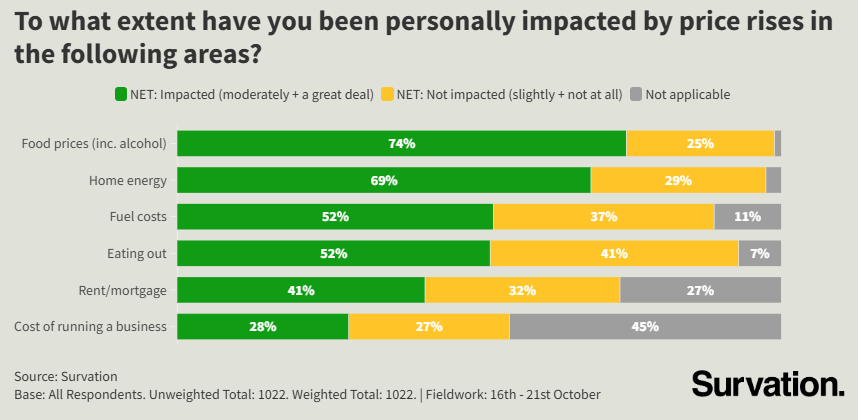
The party of the “I’m alright, Jacks”? How Labour are losing voters feeling the squeeze
With today’s Autumn Budget, Rachel Reeves faces the prospect of a £20bn hole in the public finances and, after flirting with tax rises and spending cuts, she has since backtracked on those manifesto-breaking commitments. Yet beyond the machinations of politicians and economists, and sticking to her self-imposed fiscal rules, Reeves must also consider what the general public hope to get out of the Autumn Budget. With cost of living at an all time high – and consistently ranked as a top issue facing the country – the data suggests they would hope the Budget gives them a reason to feel optimistic.
Personal impact of the cost of living crisis at an all-time high
The cost of living has consistently been one of the top issues facing the country in the eyes of the public in recent times, often along with the NHS and immigration. However, when the nation is asked about the issues most personally impacting their lives, cost of living takes a dramatic lead.
7 in 10 (70%) respondents identified the cost of living crisis as one of the three issues facing the country that have the most personal impact on them. Health and the NHS is a distant second (47%), before we drop down further to find the economy generally in third (33%) and immigration on little over a quarter (27%). The salience of immigration as an issue facing the country is, therefore, not matched by its individual significance to the average voter. It is the cost of living crisis that weighs heavily on people’s minds.
It is obvious why. In four of six options we put to respondents, majorities have been impacted by price rises. This included: food and alcohol prices (74%), home energy (69%), fuel costs (52%), and eating out (52%). Only rent and mortgage costs, along with those associated with running a business, formed the exceptions. With the former, this is likely a result of differences between age groups – 52% of 25-34 year olds felt impacted by costs here, compared to just 18% of those aged 65 and over. The latter costs did not apply to 45% of the sample.
Under such circumstances, it is no surprise to find that a majority of Brits are planning to cut back their spending, either somewhat or completely, across numerous areas to deal with the ongoing cost of living crisis over the next three months. Only one item would still be bought with the same frequency as now by a majority of our respondents: cheese (53%).
Already, a majority (55%) report reducing the amount of times they eat or drink out because of affordability. This holds across all income groups, from 59% of those on £0-19,999 a year to 51% of those earning more than £40,000.
Would-be Labour voters avoiding the pinch
Compared to those currently intending to vote for other political parties in the event of a general election, Labour would-be voters are notably less concerned by the cost of living crisis. 56% of them put cost of living as one of the three issues most personally impacting them (-14 on the national average), the lowest across all voter groups. It’s even more stark when we consider the extent to which price rises have impacted the group. Looking at the two areas where price rises have impacted Brits most – food prices (including alcohol) and home energy costs – future Labour voters were considerably less likely to report being personally impacted.
The net difference between those impacted and not impacted by food price rises is 50% nationally. For those planning to vote Labour it is 23% (-27). By contrast, people intending to vote Reform or for the Liberal Democrats are on 63% (+13) respectively. A similar picture emerges in response to home energy costs, where the net difference for Labour voters is 29% (-11 on the national average) and those leaning towards Reform are up on 49% (+9). Additionally, they were the most likely prospective voters to report having not reduced the amount of times they eat or drink out, with almost 4 in 10 (38%) continuing as normal. Conservatives were the second most likely (31%) whilst future Reform voters were least (19%).
Labour’s challenge surrounding the Autumn Budget
The cost of living crisis is the dominant issue of the day. Labour and Rachel Reeves are in an unenviable position and it is not one where they can ignore the feelings of the general public – nor their eroding voter base. Those continuing to back Labour may still be experiencing the cost of living crisis along with everyone else, but they seemingly do so to a much lesser extent. As those most impacted begin to look elsewhere, it is up to Labour to deliver tangible changes that mitigate the strain on their personal finances.
—
GET THE DATA.
Survation conducted an online poll of 1,022 adults aged 18+ in the United Kingdom on behalf of the UK Spirits Alliance. Fieldwork was conducted between 16th – 21st October 2025. Tables are available here.
________________________________________
Survation. is an MRS company partner, a member of the British Polling Council and abides by their rules. To find out more about Survation’s services, and how you can conduct a telephone or online poll for your research needs, please visit our services page.
If you are interested in commissioning research or to learn more about Survation’s research capabilities, please contact John Gibb on 020 3818 9661, email researchteam@survation.com, or visit our services page.
For press enquiries, please call 0203 818 9661 or email media@survation.com
< Back

